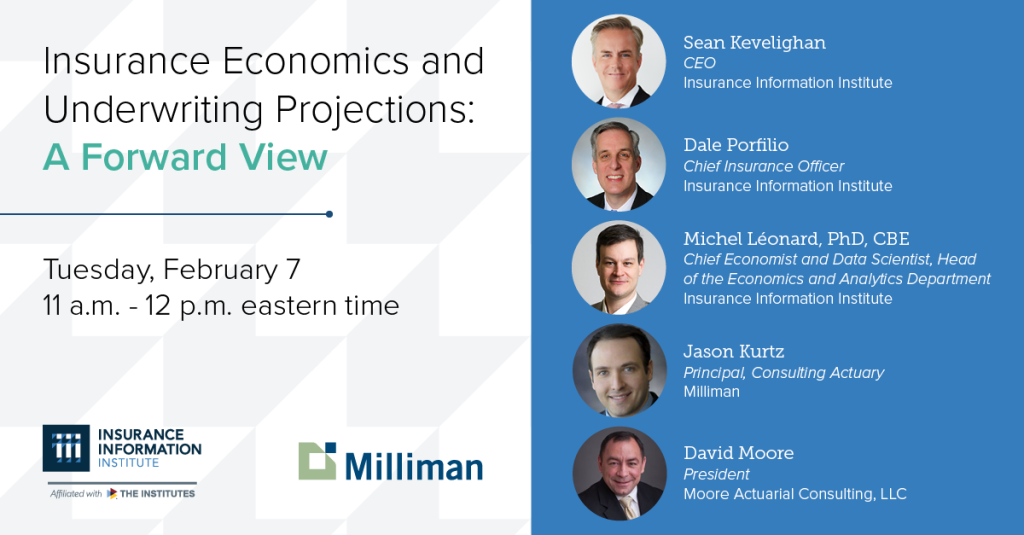Inflation Trends Shine Some Light for P&C, But Underwriting Profits Still Elude Most Lines

Moderating inflation and replacement costs provide glimmers of hope for property & casualty insurers, but underwriting profitability will remain a challenge for most lines of business for the foreseeable future, according to actuaries at Triple-I and Milliman, a risk-management, benefits, and technology firm. Their findings were presented at a Triple-I’s quarterly members-only webinar.
Dr. Michel Léonard, Triple-I chief economist and data scientist, forecast that costs of materials and labor involved in replacing or repairing insured property will decline from 8.1 percent at year-end 2022 to 4.5-6.5 percent at the end of 2023 on the way to 0.9 percent in 2024. Supply-chain issues since the start of the COVID-19 pandemic and Russia’s invasion of Ukraine have kept replacement costs at historic highs.
When the cost to repair or replace damaged cars or homes is high, premium rates that determine how much policyholders pay for coverage should rise proportionately. As Triple-I has previously reported, though, this has not been the case for homeowners and auto insurance. Premium rates for both of these lines of insurance have not kept up with rising costs. As a result of these and other factors, insurers have struggled to remain profitable.
Personal auto replacement costs, Dr. Léonard projected, will fall from nearly 10 percent to near 0 percent by 2024. Homeowners replacement costs are predicted to fall from 7.6 percent to below 2 percent by 2024.
Worsening profitability generally
The P&C industry’s 2022 combined ratio – a measure of underwriting profitability – is estimated at 105.8, a 6.3-point worsening from 2021. Combined ratio represents the difference between claims and expenses paid and premiums collected by insurers. A combined ratio below 100 represents an underwriting profit, and one above 100 represents a loss.
For the overall P&C industry underwriting projections, Porfilio said, “We forecast premium growth of 8.4 percent in 2022 and 8.5 percent in 2023, primarily due to hard market conditions and exposure growth.”
The personal auto line of insurance has been a primary driver of the industry’s weak underwriting results. Dale Porfilio, Triple-I’s chief insurance officer, said the 2022 net combined ratio for personal auto insurance is forecast at 111.8, 10.4 points worse than 2021 and 19.3 points worse than 2020. He said supply-chain disruption, labor shortages, and costlier replacement parts all contribute to current and future loss pressures.
For the commercial multi-peril line, Jason B. Kurtz, a principal and consulting actuary at Milliman, said underwriting losses are expected to continue.
“Insurers will need to consider rate increases to offset economic and social inflation loss pressures,” Kurtz said.
Dave Moore, president of Moore Actuarial Consulting, said the 2022 combined ratio for commercial auto is forecast to have worsened in 2022. Moore also stated that general liability is deteriorating.
“We forecast a small underwriting profit for 2023 and 2024, but inflation and geopolitical risk put pressure on these forecasts,” he said, adding, “premium growth from the hard market is forecast to slow in 2022 to 2024.”
For the commercial property line, Kurtz noted that the industry is seeing strong premium growth and that rate increases should help alleviate some of the pressure from catastrophe losses. Despite Hurricane Ian, he said he expects an underwriting profit in 2022, continuing into 2023 and 2024.
Donna Glenn, chief actuary at the National Council on Compensation Insurance, noted that the workers compensation line of business has seen declines in rates and loss costs for several years, partially driven by reductions in on-the-job accident frequency. This line, Glenn added, is expected to continue its profitability.
Learn More:
Drivers of Homeowners Rate Increases (Triple-I Issues Brief)
Personal Auto Insurance Rates (Triple-I Issues Brief)
Risk-Based Pricing of Insurance (Triple-I Issues Brief)





